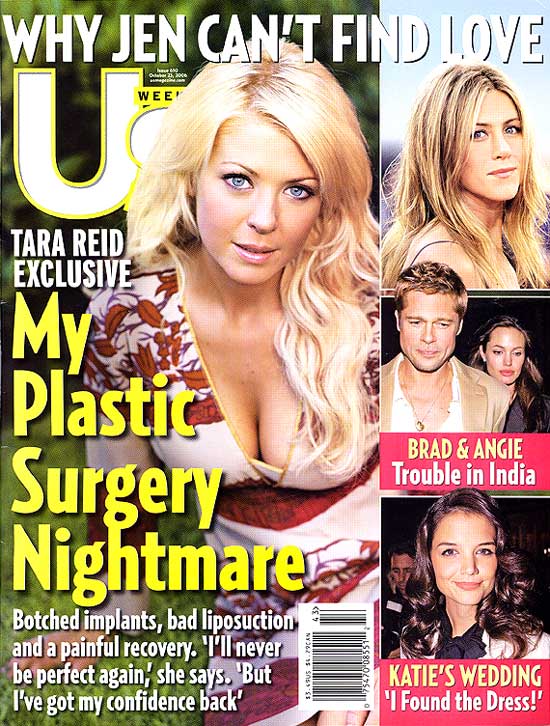Nature vs. Nurture: And where the individual fits in…
The “nature vs. nurture” argument is one that comes up constantly in discussions of gender identities. While it is commonly accepted that gender is constructed (as opposed to sex, which is biologically determined), how much of this construction is done by society, and how much is done by individuals themselves? If we are to view gender as an ‘accomplishment’, as Dull and West do, how much of the motivation to accomplish or ‘do’ gender is driven by societal values, and how much is driven by individual desires? And where do the cold hard facts of human nature and evolution fit into all of this? Much of the discussion around cosmetic surgery revolves around similar questions of society, the individual, and human nature.
Dull and West argue that cosmetic surgery is evidence of the body “not merely [being] adorned and altered, but physically reconstructed in accord with prevailing cultural conceptions” (67). The idea that cosmetic surgery is a means by which people (women in particular) either knowingly or unknowingly conform to constricting societal values and ideals, is one that is commonly used by those who oppose the practice. Opposition to societal and cultural values and beliefs often stems from the fact that society often constructs ideals (of beauty, race, gender, class etc), the obtaining of which come at a very high price. The word ‘ideal’, by definition, is the conception of something in its perfection. A standard of perfection that by nature, is unachievable, but that society still wants us to achieve. In the case of women, particularly Third World Women, society’s values are directly linked to the “increasing importation and value of Western beauty ideals” (Banales, 132). According to Banales, “cosmetic surgery is a capitalist industry whose profits rely on commodifying and selling ‘ideal’ bodies and faces” (141). It is an industry that works through “the construction of desire for the ‘perfect body’” (141). The argument that cosmetic surgery perpetuates problematic societal ideals is a convincing one, but appears to be in conflict with Dull and West’s observation of another motivation behind the choice to participate in the practice.
According to the studies carried out by Dull and West, there is a certain desire to not only accomplish gender, but also to achieve normalcy, through cosmetic surgery. There is a fundamentally inherent conflict, between the striving for societal ideals and the achievement of normalcy, that the practice of cosmetic surgery brings to light. Patients who had undergone surgery in Dull and West’s survey often attempted to justify their decision by describing it as normal. One woman said that “changing something… about one’s looks seems so easy, so normal” (56). Granted, the desire to be normal, just like the desire to be ideal, can be driven by society. However, most people have differing ideas of what is ’normal’ (as evidenced by a question brought up in class asking how many people thought that there were other people in the room who were more ‘normal’ than themselves). This suggests that there is some form of individual perception or interpretation of ‘normal’ going on that is not solely driven by societal influences. This idea of individual construction of normal is evident in one surgeon’s explanation of why people see themselves as abnormal: “You see, the perceived deformity relates to that person’s particular situation in life. Their jobs or their perceived role.” (57). This individual perception then provides some kind of counter-argument against the notion that all of our decisions and desires are based on our enculturation to society’s ideals.
And where does the ‘nature’ in the nature vs. nurture argument fit into all this? According to Dull and West, “women’s concerns for their appearance are essential to their nature as women” (64). It can be argued that this is, to some extent, true. While society certainly plays a huge part in telling women that they should be aware of their appearance, so does evolution. Men are apparently attracted the most, to women with larger breasts and wider hips, body traits that act as indicators of fertility. So is it then part of womens’ nature to want to be the most desirable, particularly if it means it will attract the attention of potential mates? Is cosmetic surgery then just a tool in helping us fulfill our ingrained desire to be desirable?
Comments are closed.

Nat–
You structure the argument of this paper around the binary of individual-vs.-society (i.e. how much of gender construction is “done by society, how much by individuals themselves?”) My first nudge back is (predictably) to question the binary construction itself: how much of what we call “individual” is actually socially constructed? How much of social construction is an amalgam of individual choices? How to tell the difference between the two? We’ve been problematizing this relation—like that between gender and technology—since very early in the semester–and I’d like to “nudge” you to make it more problematic here. Ditto your third category—those “cold, hard facts of human nature”—which we have similarly challenged, most especially in the material on intersex and transgender. (For much more questioning of the “factual” quality of science in general, and biological evolution in particular, see also The Story of Evolution and the Evolution of Stories).
The most interesting thing I see you doing here is contrasting the (definitionally unachievable) “ideal” against the (you-say-more-varied) “norm.” I’d like to hear you think that distinction through more thoroughly; I’m not yet convinced that the norm isn’t also a shared, social standard….you’re going to need more data than one anecdote from class to make that argument!